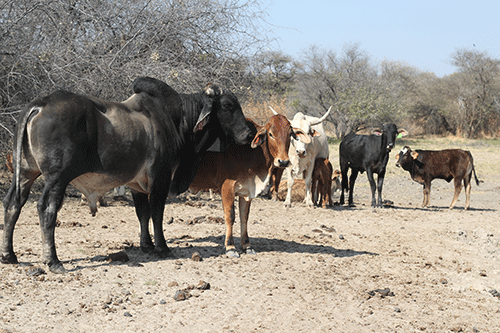The government will embarkon a study to determine the practicality of establishing a veterinary buffer zone between Angola and Namibia.
The plan was revealed by deputy minister of agriculture and land reform Anna Shiweda while motivating the ministry’s budget in the National Assembly recently.
There are an estimated 1.5 million cattle in the NCAs. The NCAs cover parts of the Kunene, Omusati, Oshana, Ohangwena, Oshikoto, Kavango West, Kavango East and Zambezi regions.
Along with South Africa and Botswana, Namibia is one of the biggest beef exporters to the EU.
If the establishment of a buffer between Namibia and Angola is deemed practical, it will not result in the removal of the veterinary cordon fence, notoriously known as the red line.
It will only mean that certain areas north of the red line could benefit through a different zonation, which will then create new markets for their beef as a consequence while a lasting solution for the red line is sought, agriculture sources said.
The VCF is a border between the north and south, which is used as an animal disease control mechanism. Its critics see it as a colonial, economic and social oppression tool.
The ministry will also continue with “beef value chain development in the NCA to enable the operationalisation of the abattoirs and complete the construction of the Ongwediva meat processing plant.
“Our country, its people and, indeed, our national development plans anchor their aspirations on agriculture and the land resource as indispensable means for economic progression and social transformation,” Shiweda said.
The ministry, she added, will also procure various doses of vaccines and undertake annual vaccination campaigns and farm inspections in line with best international standards as well as procure diagnostic materials and support the maintenance of the central veterinary laboratory.
Land question
In its quest to address the land question, the government spent N$83 million during the 2022-2023 financial year to buy eight farms for resettlement purposes, with a combined land mass of 39 731.368.
Shiweda seemingly conceded that land acquisition continues to be a thorn in the government’s flesh in the face of dwindling resources and exorbitant market prices.
“Funding resources constraints and market price considerations limit the scale and speed of land acquisition,” Shiweda lamented. During the just-ended financial year, the government resettled 18 beneficiaries, while one farmers’ co-operative was given three units.
Brimming with confidence, Shiweda said the acquisition of three farms near the Neckartal Dam in the south, with a combined size of 19 137.594 hectares at the cost of N$18.6 million, also forms part of their success story as a ministry.
The said farms are for the development of the Neckartal irrigation project phase two.
In addition, over 2 180 communal land right registrations were ratified by communal land boards, strengthening the security of land tenure in communal areas.
“A revised resettlement policy was approved by Cabinet, providing for, among others, the option of resettled farmers to have titles over their allocated farms, thus fully realising the empowerment objectives of the land reform agenda,” she expanded.
The ministry, she hastened to say, is also seized with the implementation of the resolutions of the second land indaba of 2018.
At the moment, 25 resolutions have been fully implemented, while 134 are ongoing, she told parliament.
“A high-level committee, composed of various stakeholders and chaired by the right honourable Prime Minister, is set up by the cabinet and is charged with the responsibility to implement the resolutions,” the politician said.
For the current financial year, the ministry’s proposed budget is N$1.8 billion.
This is 27% more than what the ministry received during the preceding financial year, a positive development according to Shiweda. Last year, the ministry got a budgetary allocation of N$1.3 billion.
“In addition, the proposed development budget under this allocation amounts to N$470 million, about 38% better than the revised allocation for the financial year 2022/23 and 7.2% of the total development budget outlay.
At 2.4% of total non-statutory expenditure and coming in below 1% of GDP, significant alignment to agriculture as a national priority sector, let alone the added land reform function, would be urgently needed in the coming years.
“This will enable the government to make notable progress in achieving our ambitions for food security and self-sufficiency in basic staple foods, and if we are to make an accelerated dent in reducing income inequalities of historical proportions associated with the political economy of our country,” she continued.
In total, the ministry envisages spending at least N$221 million on land-related programmes.
These include land acquisition for resettlement purposes; provision of post-resettlement support services and supporting programme implementation in collaboration with the regional authorities, as well as the development of regional land use plans.
The implementation of the flexible land tenure system to provide title deeds to residents in urban and peri-urban areas will also be funded through this allocation.
The long-awaited draft land legislation is also expected to head to parliament this year, she said.
“One of the transformational reforms envisaged for the coming financial year is the tabling of the Land Bill in Parliament, which is now at the advanced legal drafting stage,” said Shiweda.
The bill will, among others, provide for the legal framework to implement the resolutions of the second land conference.
“Further, a revised criterion for resettlement will be developed on the back of the revised resettlement policy as approved by the cabinet this year to give greater impetus to assessed productivity of the farms and to promote youth, women and vulnerable groups’ consideration in the resettlement activities,” she further buttressed.
- emumbuu@nepc.com.na


